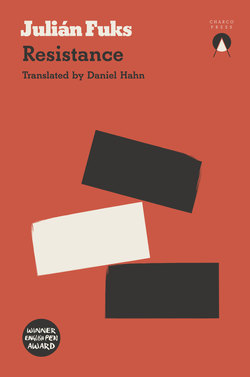Читать книгу Resistance - Julián Fuks - Страница 13
На сайте Литреса книга снята с продажи.
Оглавление7.
This is not just a story, not just his story. This is history.
This is history, and yet, almost everything I have at my disposal is memory, fleeting notions of days long gone, impressions that precede consciousness and language, destitute relics I insist on embezzling into words. This isn’t a matter of some abstract preoccupation, though I do make use of abstractions: I’ve looked for my brother in what little I’ve written up to now and he is nowhere to be found. Maybe some idea would have done him justice, the description might by chance have evoked him, the handful of apparently truthful facts I’ve spread into my winding paragraphs, but nothing. From this unnecessary observation, you are not to assume naïveté on my part, at least not for now: I’m well aware that no book could encapsulate any human being, no book could ever reconstruct in paper and ink an existence of blood and flesh. What I’m saying here is something more serious, not just a kind of literary formalism: I’m talking about the fear of losing my brother, and I feel with every sentence that I’m losing him more.
For a moment I’m confused, I forget that things can also precede words, that trying to tap into them will always involve new fallacies, and I go around this apartment just as I went around the text, in search of traces of my brother, something that might restore his reality to me. I’m not in his house, my parents’ house, where I can imagine him shut up in the bedroom, I can’t knock on his door. There are thousands of kilometres separating us, a whole country separating us, but one thing that works to my advantage is our mother’s strange habit of scattering the family homes with objects that keep us in contact. This Buenos Aires apartment has nobody living in it. Ever since my grandparents’ death it’s just been a place for passing through, a crossroads for distant relatives, distracted and hurried, who have forgotten one another’s existence. I happen upon a photo album lying flat on the bookcase, left at just the perfect angle to look casual. I have to turn a few pages before I’m finally assailed by my brother’s face, before I’m finally surprised by what I was already expecting.
The photo doesn’t say what I want it to say, the photo doesn’t say anything. The photo is merely his soft face in the middle of a shady veranda, his eyes looking at me through the photographer’s lens, those eyes that are so light, that hair smoother than I could have imagined – his childish beauty that perhaps I envied. His head is tilted to one side as though he were asking something, but I know it’s not for me to make up what it is. His half-open lips are quiet, too, but that’s where my gaze is drawn merely to be quite sure of the injustice I am doing him, the injustice I’m doing my brother in this very indelicate attempt. I can’t make this boy, the boy and the man he is today, a fragile character. I can’t assign some unreasonable pain or other to him, reducing him to an excessive sensitivity that might evoke pity, subjecting him to easy distress. And above all, I cannot make my brother mute, deprived of any means of defending himself, of confessing himself – or of keeping quiet when the situation calls for it. Why can I not let him speak, attribute even the smallest phrase to him in this fiction? With this book will I be trying to steal his life, to steal his image, and also to steal, in minor thefts, his silence and his voice?
I can’t decide if this is a story.
